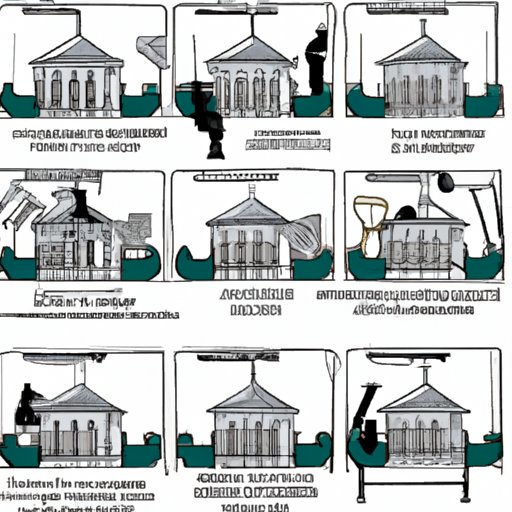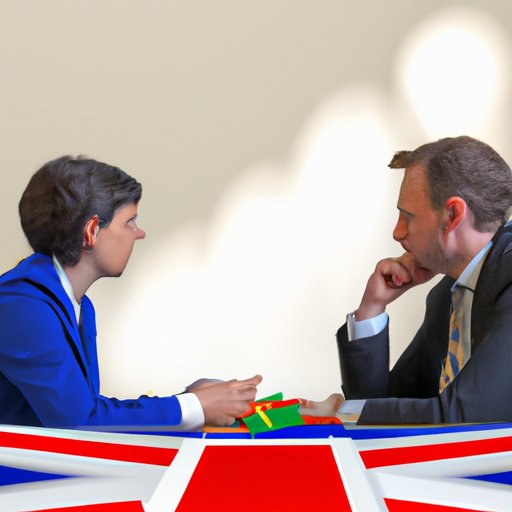Overview of the UK’s Political System
The United Kingdom is a unitary state governed by a parliamentary system. The UK’s political system is based on a combination of constitutional conventions, common law, statutes and administrative regulations. The executive branch of the government is led by the Prime Minister, who is appointed by the monarch. The Prime Minister then selects the members of their Cabinet, which makes key decisions and implements policy. The legislative branch of the government is made up of two houses: the House of Commons and the House of Lords. The House of Commons is elected by citizens in the UK and is responsible for passing legislation. The House of Lords, on the other hand, is not elected but instead consists of hereditary peers, appointed life peers and bishops of the Church of England.

Explaining the Roles and Responsibilities of the Prime Minister and Cabinet
The Prime Minister is the head of the government and is appointed by the monarch. The Prime Minister is responsible for setting the goals and direction of the government. They also have the power to appoint and dismiss ministers, set the agenda for parliament, and determine the policies of the government. The Prime Minister is also the leader of the political party that holds the majority in the House of Commons.
The Cabinet is the main decision-making body of the government. It is made up of senior ministers appointed by the Prime Minister. The Cabinet is responsible for making policy decisions, agreeing on government priorities and setting the direction of the government. The Cabinet meets regularly and its decisions are implemented by the civil service.
Examining the House of Commons and House of Lords
The House of Commons is the lower house of the UK Parliament and is made up of 650 elected Members of Parliament (MPs). MPs are elected by citizens in the UK to represent their constituency in the House of Commons. The House of Commons is responsible for passing legislation and scrutinising government policy.
The House of Lords is the upper house of the UK Parliament and is made up of over 800 members. These members include hereditary peers, appointed life peers and bishops of the Church of England. The House of Lords does not have the power to pass legislation, but it can amend or reject bills passed by the House of Commons.

How Laws are Passed Through Parliament
The process of passing laws in the UK is known as the legislative process. A bill must be approved by both the House of Commons and the House of Lords before it can become law. Once a bill has been introduced in the House of Commons, it is sent to a committee for further scrutiny. The committee will look at the details of the bill and may suggest changes. The bill is then debated in the House of Commons and voted on. If the bill passes the vote in the House of Commons, it is sent to the House of Lords for further debate and voting. If the bill is approved by the House of Lords, it is then passed to the monarch for Royal Assent. Once the bill has received Royal Assent, it becomes law.
Describing the Role of Local Governments
Local governments in the UK provide essential services such as education, social care, housing and transport. Local governments are funded by central government grants, council tax and business rates. Local governments are accountable to the citizens of their local area and must adhere to national laws and policies. Local governments work closely with central government to ensure that policies are implemented effectively.
Investigating the Devolved Assemblies in Scotland, Wales and Northern Ireland
The devolved assemblies in Scotland, Wales and Northern Ireland were established to give these regions more autonomy over certain policy areas such as health, education and transport. The assemblies are made up of elected representatives from each region. The assemblies have the power to pass legislation in their respective regions, although some policies are still determined by the UK government.

Discussing the Relationship Between the UK Government and the European Union
The UK was a member of the European Union (EU) until 31 January 2020, when it officially left the organisation. The UK is now in a transition period until the end of 2020, during which time the UK and EU are negotiating a new relationship. The outcome of these negotiations will determine the nature of the UK’s relationship with the EU going forward.
The UK government is currently seeking to negotiate a ‘free trade agreement’ with the EU. This would involve reducing tariffs and quotas on goods and services traded between the UK and EU. It is hoped that this would help to protect jobs and businesses in the UK, while also maintaining close ties with the EU.
The UK’s relationship with the EU is likely to remain uncertain until the end of the transition period. However, it is clear that the UK government is committed to protecting the interests of the people of the UK, while also maintaining close ties with the EU.
(Note: Is this article not meeting your expectations? Do you have knowledge or insights to share? Unlock new opportunities and expand your reach by joining our authors team. Click Registration to join us and share your expertise with our readers.)
